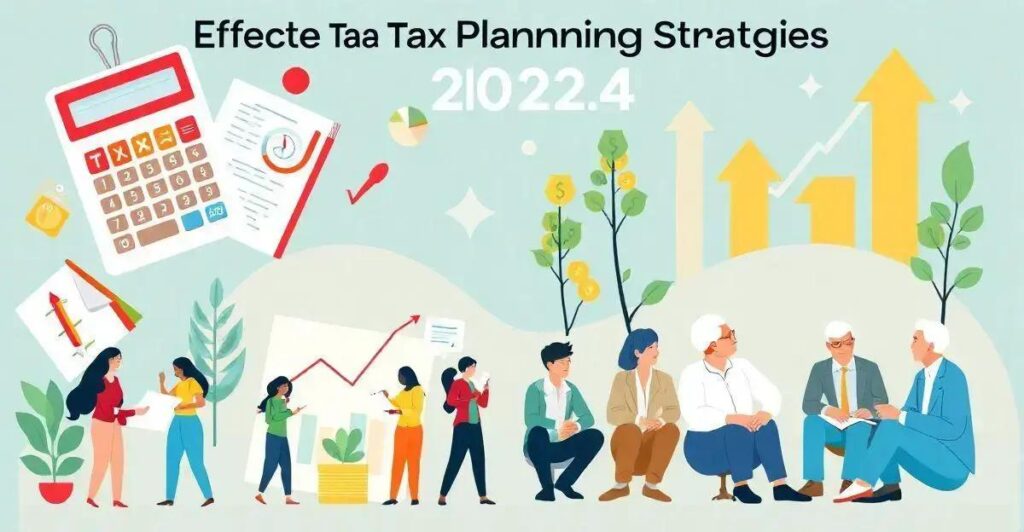Are you tired of feeling overwhelmed by the complexities of tax planning? With the right strategies, you can achieve financial freedom and avoid costly mistakes.
In this article, we’ll explore the importance of tax planning, common mistakes to avoid, and effective strategies for individuals and businesses alike.
By the end of this post, you’ll be equipped with the knowledge you need to take control of your finances and achieve your goals.
Understanding Tax Planning
Tax planning is the process of anticipating and minimizing tax liabilities by making informed financial decisions. It involves understanding the current tax laws and regulations and identifying opportunities to reduce tax burdens. Effective tax planning requires a thorough analysis of an individual’s or business’s financial situation, including income, expenses, and assets. By understanding the tax implications of financial decisions, individuals and businesses can make informed choices to achieve their financial goals and build a secure financial future.
Benefits of Effective Tax Planning

Effective tax planning can bring numerous benefits to individuals and businesses, including reduced tax liabilities, increased savings, and improved financial flexibility. By understanding the tax implications of financial decisions, individuals and businesses can make informed choices that align with their financial goals.
Effective tax planning can also provide peace of mind, as individuals and businesses can have confidence in their financial futures. Additionally, effective tax planning can help individuals and businesses to stay ahead of the competition, by allocating resources more efficiently and making informed financial decisions.
With the right strategies and tools, individuals and businesses can achieve financial success and security.
Common Tax Planning Mistakes
One of the most common tax planning mistakes is failing to take advantage of tax credits and deductions. This can result in missing out on significant savings and ultimately increasing tax liabilities.
Another mistake is not properly documenting expenses, which can lead to disputes with the IRS and financial penalties.
Additionally, not seeking professional tax advice can result in poor financial decisions and increased tax liabilities.
Furthermore, not staying up-to-date with changing tax laws and regulations can lead to non-compliance and financial penalties.
By avoiding these common mistakes, individuals and businesses can ensure compliance with tax laws and regulations and achieve their financial goals.
Tax Planning Strategies for Different Income Groups

Effective tax planning strategies can vary depending on an individual’s or business’s income level, financial situation, and goals.
For example, low-income individuals may benefit from strategies such as the earned income tax credit, while high-income individuals may benefit from strategies such as tax-loss harvesting.
Small business owners may benefit from strategies such as incorporating their businesses and claiming business expenses.
Additionally, individuals and businesses with complex financial situations may benefit from strategies such as tax-deferred retirement accounts and charitable giving.
By understanding their financial situation and goals, individuals and businesses can develop effective tax planning strategies tailored to their needs.
With the right strategies and tools, individuals and businesses can achieve financial success and security.
Tax Planning for Small Business Owners
As a small business owner, tax planning is crucial to the success and sustainability of your business.
Effective tax planning can help you reduce tax liabilities, increase savings, and achieve your financial goals.
By incorporating your business, claiming business expenses, and taking advantage of tax credits and deductions, you can optimize your tax situation and make informed financial decisions.
Working with a Tax Professional
Additionally, working with a tax professional can help you ensure compliance with tax laws and regulations and achieve your financial goals.
With the right strategies and tools, small business owners can achieve financial success and security.
Tax Planning for Retirement

Tax planning is a crucial aspect of retirement planning, as it can have a significant impact on one’s financial well-being.
Effective tax planning can help individuals reduce their tax liabilities, increase their retirement savings, and achieve their financial goals.
By understanding the tax implications of retirement, individuals can make informed decisions about their investments, income, and expenses.
Strategies such as tax-deferred retirement accounts, such as 401(k) and IRA, can help individuals reduce their tax liabilities and increase their retirement savings.
Working with a Tax Professional
Additionally, working with a tax professional can help individuals ensure compliance with tax laws and regulations and achieve their retirement goals.
With the right strategies and tools, individuals can achieve financial success and security in retirement.
FAQ – Frequently Asked Questions about Tax Planning
What is tax planning?
Tax planning is the process of planning and managing your finances to minimize your tax liability and maximize your financial well-being.
Why is tax planning important?
Tax planning is important because it can help you save money on taxes, reduce your financial stress, and achieve your financial goals.
What are some common tax planning mistakes?
Some common tax planning mistakes include not taking advantage of tax credits and deductions, not seeking professional tax advice, and not staying up-to-date with changing tax laws and regulations.
How can I reduce my tax liability?
You can reduce your tax liability by taking advantage of tax credits and deductions, seeking professional tax advice, and staying up-to-date with changing tax laws and regulations.
What are some tax planning strategies for different income groups?
Tax planning strategies can vary depending on an individual’s or business’s income level, financial situation, and goals. For example, low-income individuals may benefit from strategies such as the earned income tax credit, while high-income individuals may benefit from strategies such as tax-loss harvesting.
What are some tax planning strategies for small business owners?
Tax planning strategies for small business owners include incorporating the business, claiming business expenses, and taking advantage of tax credits and deductions. Additionally, working with a tax professional can help small business owners ensure compliance with tax laws and regulations and achieve their financial goals.
What are some tax planning strategies for retirement?
Tax planning strategies for retirement include understanding the tax implications of retirement, taking advantage of tax-deferred retirement accounts, and working with a tax professional to ensure compliance with tax laws and regulations and achieve financial goals.



